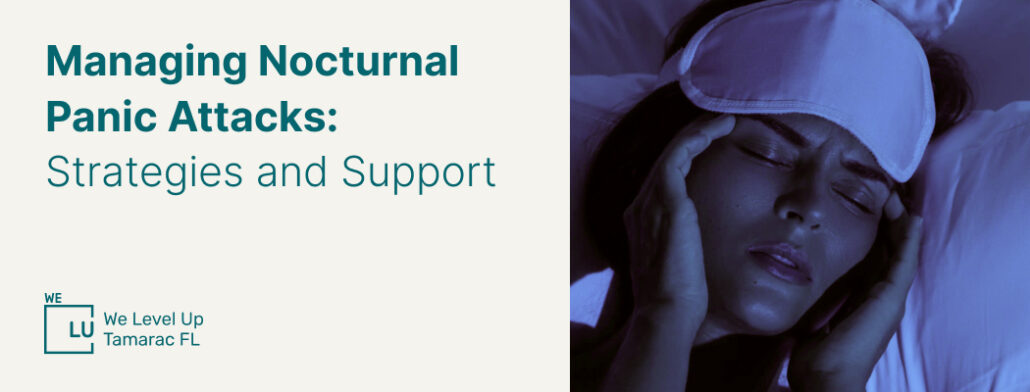Nocturnal panic attacks can often ruin a peaceful night and turn it into an intense wave of anxiety. This can leave you struggling with fear and stress during the late hours. It is recognized by sudden, overwhelming feelings that can disrupt sleep patterns and greatly impact overall well-being.
Managing these kinds of panic attacks requires mental health facilities in Florida to create a unique approach that covers both symptoms and causes. Addressing symptoms may only give us some answers but won’t lead us to our goal. Still, that is what most experts focus on. On the other hand, at We Level Up Tamarac FL, we understand the importance of tackling both and know that every person is different, which is why we can tailor our methods to fit your exact temperament and situation.
Skip to:
What is the Nocturnal Panic Attack?
A nocturnal panic attack comes with a set of special challenges. These challenges are very different from those of panic attacks that occur during the day. There is a huge difference between them. Daytime panic attacks are often triggered by stressors or specific situations. On the other hand, nocturnal panic attacks occur during sleep, which usually leads to sudden awakening.

Nocturnal panic attacks should not be confused with nightmares. The main difference between them is that nightmares usually feature specific dream sequences that disturb the person. Even though this may wake you up, it is only an imagery. It may have a strong effect on you if it’s tied to a specific trauma, but that is a completely different topic.
Panic attacks at night come with physical symptoms that make the overall experience much stronger than a regular nightmare. These physical symptoms may include a racing heart, breath shortness, sweating, and various strong emotions. Understanding the difference between nightmares and signs of panic attack while sleeping is very important as it helps us develop a tailored strategy to solve the problem.
Get Help. Get Better. Get Your Life Back.
Searching for Accredited Dual Diagnosis Mental Health Centers Near You?
Even if therapy failed previously, or are in the middle of a difficult crisis, we stand ready to support you. Our trusted behavioral health specialists will not give up on you. When you feel ready or just want someone to speak to about counseling alternatives to change your life call us. Even if we cannot assist you, we will lead you to wherever you can get support. There is no obligation. Call our hotline today.
FREE 24/7 Dual Diagnosis Mental Health Services HotlineSymptoms of Nocturnal Panic Attacks
Nocturnal panic attack symptoms can be very confusing as they occur in the middle of sleep. They break the sleep cycle and disrupt the overall quality of rest. Since the symptoms manifest differently for everyone, it is crucial to be able to recognize them. Sometimes, indications will be sweating and increased heart rate, but they may not necessarily occur because of panic attacks.
It’s vital that you listen to your body and change some everyday habits for a while if necessary. If you worry about an increased heart rate, quit caffeine temporarily and see what happens. You don’t have to quit for good, but if you want to try to solve your problem, at least do it for a month. These physical reactions can come from various sources, so it’s necessary to do whatever you can to get to the cause.

Other indications may include unexpected, all-consuming feelings of fear. These intense emotions might disrupt your sleep cycle, making it difficult to fall back to sleep. And if that continues to happen, it can drastically affect your mental health as well (due to sleep deprivation). The feelings of terror can also add another layer of complications as they stimulate your brain to produce (more) nightmares. Although we mentioned that there is a notable difference between panic attacks and nightmares, we are sure that nobody wants to deal with either of them.
Understanding nocturnal panic attack symptoms is crucial for developing a plan for further action. However, you should make a clear distinction – are you having regular sleep problems, or are you experiencing panic attack symptoms at night? This helps your healthcare provider ensure the appropriate intervention that will solve the problem for good.
What Causes Nocturnal Panic Attacks?
Understanding what causes panic attacks at night is essential for creating an effective long-term strategy to prevent them from happening again. While the triggers may vary from person to person, these are the factors that contribute:
- Anxiety disorders — Nocturnal panic attacks often find their roots in anxiety disorders. These are disorders like generalized anxiety disorder (GAD), panic disorder, or post-traumatic stress disorder (PTSD). People with these kinds of disorders, especially the ones that didn’t go through any anxiety treatment Florida doctors recommend, are far more likely to experience a panic attack at night.
- High levels of stress — Stressful life events, pressure at work, relationship issues, or any other event that involves a higher amount of stress may produce emotions that the brain is trying to process during sleep. If these emotions are too intense, they can cause panic attacks at night (or anytime).
- Biological factors — These entail factors like disruptions in the balance of neurotransmitters that regulate mood and stress responses. Changes in neurotransmitter levels, especially serotonin and norepinephrine, play a big role in this condition.
- Genetic predisposition — This may not always be the case, as it depends on every single individual. While your family history and genetics alone do not determine the occurrence of nocturnal panic attacks, they may influence your overall vulnerability.
- Medication and substances — Certain medications or substances, such as stimulants or recreational drugs, can disrupt sleep patterns. This can drastically contribute to the occurrence of panic attacks during the night. On the other hand, withdrawal from these substances may also create triggers. In this case, any further action should be taken with caution.
- Sleep Disruptions — This is one of the most common causes of nocturnal panic attacks. Irregular sleep patterns, insufficient sleep, or any similar condition. They all create an environment that contributes to panic attacks at night and stimulates the rise of your overall anxiety levels.
If you wonder how to stop panic attacks at night, you should know that finding the cause is the first step towards a solution, and it may not be as hard as it seems at the beginning. However, consulting with healthcare professionals — a therapist, a sleep specialist, or any other individual who can help you identify triggers — is imperative. This way, you can start developing a tailored set of actions to solve the problem.

How to Stop Nocturnal Panic Attacks
To effectively manage and stop panic attacks at night, start by learning what to do in such a situation. Efficient actions involve a combination of immediate interventions and long-term strategies. They all work in some cases, depending on the individual. However, you can never be sure which one of these methods will help you solve the problem at its core. This is why it’s essential that you consult a professional.

End the Emotional Pain. Get Your Life Back.
Feeling Depressed, Anxious or Struggling with Mental Health Illness? Get Safe Comfortable Mental Health Dual Diagnosis High-Quality Therapy From Counselors That Care. Begin Your Recovery Now.
Hotline (855) 940-6125When it comes to immediate interventions, they might be enough sometimes. But in many cases, they are just useful tools to have at the beginning of the process. Some of these immediate interventions include:
- Focused Breathing Techniques – Practice controlled deep breathing to calm the nervous system. Inhale slowly through the nose, hold for a few seconds, and slowly exhale through your mouth. This kind of breathing helps regulate oxygen levels and calms your body.
- Progressive Muscle Relaxation (PMR) — You can do this by systematically tensing and then releasing different muscle groups. The PMR technique can help you achieve physical relaxation, easing the tension and discomfort associated with panic attacks.
- Grounding Techniques — Ground yourself in the present moment by using sensory cues. Focus on the sensation of touch, such as feeling the texture of an object, breathing a specific smell, or tasting a glass of lemonade. Include all your senses. This helps redirect attention away from anxious thoughts.
- Mindfulness and Meditation — These skills can help you bring awareness to the present moment. Mindfulness exercises, such as guided imagery or body scans, can help soothe the mind and reduce anxiety. If you’re not familiar with any of these exercises, you can start with guided meditations.
- Comforting Environment — Surround yourself with calming elements in your sleep environment. Dim the lights, play relaxing music, or use aromatherapy with scents like lavender or anything else your mind associates with comfort.
When it comes to long-term strategies, the approach is completely different. Although, as we said, they might not always be needed, it is better to be prepared and get to know them. Some of these long-term strategies to prevent and manage nocturnal panic attack symptoms include:
- Cognitive Behavioral Therapy (CBT) — Therapists often rely on CBT for anxiety disorders. It’s a highly effective therapeutic approach that targets thought patterns and behaviors that lead to panic attacks. CBT helps individuals reframe negative thinking and develop coping mechanisms.
- Consistent Sleep Routine — This might seem obvious at first, but many people still don’t do it. Prioritize regular sleep patterns by going to bed and waking up at the same time each day. Start by creating a bedtime routine that relaxes you. This signals to your body that it’s time to calm down. These can be simple routines such as reading a book or taking a warm bath.
- Limited Stimulants and Screen Time — Although it’s not necessarily an action, it is more a lack of action. Reducing the consumption of stimulants like caffeine and nicotine, especially in the evening hours, can drastically help. Another thing to keep in mind is to minimize screen time before bed. The devices emit blue light that can decrease sleep quality and sleep duration because it interferes with the production of melatonin (the sleep hormone).
- Physical Exercise — Build a habit of engaging in regular physical activity every day. This will reduce your stress levels and help you get better sleep. However, you should avoid high-intensity exercise close to bedtime, as it may give you more energy and disrupt your sleep pattern.
- Professional Support — Consult with professionals like therapists or doctors. It is important to have personalized guidance and support. Professional intervention can help you use all these strategies in the best way possible. They will provide a structured approach to addressing the root causes of panic attacks and help you develop an effective strategy.
As you can see, preventing and stopping panic attacks (whenever they occur) requires patience. It is a marathon, not a sprint. Sure, there are people who can solve the problem just by doing breathing exercises, but unfortunately, for most people, the reality is different. Resolving this issue involves more effort and time. Bear in mind the problem is not solved until it stops coming back.

Finding Professional Support to Get Diagnosis
Seeking professional help is crucial to getting an accurate diagnosis and treatment plan tailored just for you. As we already mentioned, many symptoms overlap with other sleep disorders. Therefore, you should not do anything on your own.
To locate a reputable facility for comprehensive diagnosis and care, you might consider searching for “inpatient mental health near me” online. Among other options, you’ll likely find our We Level Up Tamarac FL facility. What distinguishes us from others is our dedication and personalized approach to patient care, which seem to give great results.
Before we proceed with examination and diagnosis, we will check if you have the Aetna mental health coverage Florida residents usually have. If you don’t, we will review your insurance coverage and offer a financial plan to meet your needs and possibilities. Have no doubt that we will do our best to find a way to provide you with our services.
First-class Facilities & Amenities
World-class High-Quality Mental Health Services & Behavioral Health Substance Abuse Treatment
Rehab Centers TourRenowned Mental Health Centers. Serene Private Facilities. Inpatient Rehab Programs Vary.
Mental Health Helpline (855) 940-6125Proven recovery success experience, backed by a Team w/ History of:
15+
Years of Unified Experience
100s
5-Star Reviews Across Our Centers
10K
Recovery Successes
- Comprehensive Dual-Diagnosis Treatment
- Complimentary Family & Alumni Programs
- Coaching, Recovery & Development Events
- Comfortable Onsite Medical Detox Center
Assessment Procedure
The diagnostic process begins with a clinical evaluation, gathering a detailed medical history, and an exploration of symptoms. Patients are encouraged to provide a detailed account of their sleep patterns, anxiety levels, and any potential triggers associated with panic attacks. Sleep studies may be recommended in some cases to monitor various parameters during sleep, but this may not always be the case. Nevertheless, it’s a useful tool in identifying disruptions linked to nocturnal panic attacks.
Since a nocturnal panic attack is often linked to stress and anxiety disorders, our healthcare professional might ask about your feelings and experiences. This helps us understand if other things are going on, like anxiety disorders.
The bright side is that your doctor and therapist can use this data to create a customized strategy for you. The plan could include different ways to help you when you’re having a panic attack at night. For example, it could involve taking some medications, if necessary, or just changing daily habits, taking deep breaths, releasing muscle tension, etc.
After the inpatient treatment, regular follow-ups with our professionals help us gather additional information and adjust the treatment plan as needed. Monitoring changes in your sleep patterns and anxiety levels is crucial for identifying the right interventions.
Prevention and Management
To prevent and manage nocturnal panic attacks, you should focus on making lifestyle changes and learning coping strategies. These adjustments can positively impact your overall well-being and reduce the frequency of panic attacks at night.

When you start making lifestyle changes, start with your sleep schedule. You already know that you should find the optimal time to go to bed and get up. Going to sleep and waking up at the same time rewires your brain in a positive way. But you need to sleep 7 or more hours in order to make any kind of positive changes.
The easiest way to do this is to set the alarm for the time that suits you the best and force yourself to get up. And you need to be consistent with this practice. After a few days, your body will naturally feel more tired when it’s time to go to bed. You can also make it easier by creating a calming bedtime routine that we mentioned earlier.
Coping mechanisms encompass the long-term strategies we have talked about. Although they can be really helpful and perhaps even solve your problem, they should come after your lifestyle changes. This is crucial for any improvement when it comes to a nocturnal panic attack. Practicing an effective breathing technique won’t help you if you have trouble maintaining a regular sleep schedule. If you’re only getting 5 hours of sleep, your brain doesn’t have time to process everything, and you end up trapped in that same cycle again.
World-class, Accredited, 5-Star Reviewed, Effective Mental Health Dual Diagnosis Programs. Complete Integrated Inpatient Rehab with Free Post Discharge Therapy Planning.
CALL (855) 940-6125End the Emotional Pain Rollercoaster. Gain Stability & Happiness Through Recovery Treatment. Start Mental Health Counseling Today. Get Free No-obligation Guidance by Behaviroal Health Specialists Who Understand Mental Health Recovery.
Living With Nocturnal Panic Attacks
Asking professionals: “Why do I get panic attacks at night?” is the first step towards finding a solution to this issue. However, even when you get the answers, it will be a while until you solve the problem.
Living with nocturnal panic attacks can be challenging, but there are strategies to get through these experiences. First and foremost, get support. Share your feelings and experiences with close friends, family members, or even support groups if needed. Having emotional support and someone to talk to can make a significant difference.
Another essential aspect of managing nocturnal panic attacks is the ongoing treatment. Maintain regular contact with your healthcare providers and make sure to update them on your progress and any possible changes in symptoms that you have. Open communication ensures that your treatment plan is aligned with your needs and that adjustments can be made as needed. Remember that healthcare professionals are there to guide you and offer support. Don’t ever hesitate to reach out to them.
Include any kind of self-care activities into your daily routine to prioritize your mental state. This might include practicing mindfulness, engaging in hobbies and activities for mental health, or simply taking time for relaxation. Creating a positive and calming environment in your living space can also contribute to better sleep and a reduced likelihood of panic attacks.
Track your progress and celebrate small victories. Recognize your efforts to manage your nocturnal panic attacks and acknowledge the positive steps you’ve taken. Understand that patience is key, and progress may take some time. Be kind to yourself throughout this journey.

Remember that you are not alone in facing nocturnal panic attacks. Consider connecting with online communities or support groups. Hearing other people’s stories and insights can offer valuable information and make you feel safer knowing that you’re together in all of this.
Next Steps
Nocturnal panic attacks are manageable, and seeking help is an important but also courageous step toward a better quality of life. Remember that it takes time to see results. Each small victory is a step closer to improved well-being. By educating yourself, incorporating self-care practices, and embracing therapeutic options, you can actively work on creating a more balanced and fulfilling life. So, contact our mental health experts at We Level Up Tamarac, FL, to help you ensure restful nights and a brighter future.
Experience Transformative Recovery at the We Level Up Treatment Center.
See our authentic success stories. Get inspired. Get the help you deserve.



Start a New Life
Begin with a free call to a behavioral health treatment advisor. Learn more about our dual-diagnosis programs. The We Level Up treatment center network delivers recovery programs that vary by each treatment facility. Call to learn more.
- Personalized Care
- Caring Accountable Staff
- World-class Amenities
- Licensed & Accredited
- Renowned w/ 5-Star Reviews
We’ll Call You
Search We Level Up Tamarac FL for Managing Nocturnal Panic Attacks Topics & Resources
Sources
Brown, M. (2022). Get Enough Sleep. [online] health.gov. Available at: https://health.gov/myhealthfinder/healthy-living/mental-health-and-relationships/get-enough-sleep
Silvani, M.I., Werder, R. and Perret, C. (2022). The influence of blue light on sleep, performance and wellbeing in young adults: A systematic review. Frontiers in Physiology, 13(943108). doi:https://www.ncbi.nlm.nih.gov/pmc/articles/PMC9424753/.
Toussaint, L., Nguyen, Q.A., Roettger, C., Dixon, K., Offenbächer, M., Kohls, N., Hirsch, J. and Sirois, F. (2021). Effectiveness of Progressive Muscle Relaxation, Deep Breathing, and Guided Imagery in Promoting Psychological and Physiological States of Relaxation. Evidence-Based Complementary and Alternative Medicine, 2021(1), pp.1–8. doi: https://www.ncbi.nlm.nih.gov/pmc/articles/PMC8272667/.





